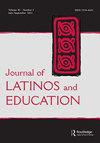Family Relationships and Academic Performance Mediated by Belongingness: Examining Sex Differences among Cuban Students
IF 1.1
Q3 EDUCATION & EDUCATIONAL RESEARCH
引用次数: 0
Abstract
ABSTRACTThe current study focused on processes underlying Cuban students’ academic performance. Using path analyses, the model examined the relations between family relationships and academic performance mediated by belongingness and moderated by sex differences among Cuban medical students (N = 613; M age = 21.39, SD = 2.05). Findings indicated that improved family relationships significantly predicted increased belongingness to the field of medicine for both male and female students. The relation between belongingness and academic performance was only significant for male students. Thus, improved family relationships informed academic performance via belongingness for male medical students.KEYWORDS: Family relationshipsbelongingnessacademic performanceCubanstudents Disclosure statementNo potential conflict of interest was reported by the authors.Additional informationFundingThis research was partially supported by a grant from the Harvard Graduate School of Education Dean’s venture fund (PI Diamond Y. Bravo). Chelsea D. Williams efforts on this article were partially supported by Virginia Commonwealth University’s Institute for Inclusion, Inquiry & Innovation (iCubed). We thank the medical students who participated in this study. We also thank the medical research assistants and faculty for their contributions to the larger study.家庭关系与学业成绩的中介:古巴学生性别差异的研究
摘要当前的研究聚焦于古巴学生学业表现的过程。通过通径分析,该模型检验了古巴医学生家庭关系与学业成绩之间的关系,这种关系由归属感介导,并受性别差异的调节(N = 613;M年龄= 21.39,SD = 2.05)。研究结果表明,家庭关系的改善显著预测了男女学生对医学领域的归属感增加。归属感与学业成绩的关系仅在男生中显著。因此,改善的家庭关系通过归属感影响男医学生的学习成绩。关键词:家庭关系、归属、学习成绩、古巴学生、披露声明作者未发现潜在的利益冲突。本研究得到了哈佛大学教育研究生院院长风险基金(PI Diamond Y. Bravo)的部分资助。切尔西·d·威廉姆斯在这篇文章中的努力得到了弗吉尼亚联邦大学包容、探究与创新研究所(iCubed)的部分支持。我们感谢参与这项研究的医学生。我们也感谢医学研究助理和教师为更大的研究做出的贡献。
本文章由计算机程序翻译,如有差异,请以英文原文为准。
求助全文
约1分钟内获得全文
求助全文
来源期刊

Journal of Latinos and Education
EDUCATION & EDUCATIONAL RESEARCH-
CiteScore
2.20
自引率
11.10%
发文量
87
 求助内容:
求助内容: 应助结果提醒方式:
应助结果提醒方式:


